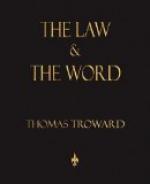If the student will look at the Bible Promises in the light of the general principles, he will find that they are perfectly logical, whether from the metaphysical or from the scientific standpoint, and that their working is only from the same Law through which all scientific developments are made. If this be apprehended it will be clear that the Word of Faith is not “trying to make ourselves believe what we know is not true,” but, as St. Paul puts it, it is “giving substance to things not yet seen” (Heb. xi, 1, R.V.).
CHAPTER VII
DEATH AND IMMORTALITY
I think most of my readers will agree with me, that the greatest of all the promises is that of the overcoming of death, for, as the greater includes the less, the power which can do that can do anything else. We think that there are only two things that are certain in this world—death and taxes, and no doubt, under the ordinary past conditions, this is quite true; but the question is: are they really inherent in the essential nature of things; or are they not the outcome of our past limited, and often inverted modes of Thought? The teaching of the Bible is that they are the latter. On the subject of taxes the Master says: “Render unto Caesar the things that are Caesar’s” (Matth. xxii, 21), but on another occasion he said that the children of the King were not liable to taxation (Matth. xvii, 26). However we may leave the “taxes” alone for the present, with the remark that their resemblance to death consists in both being, under present conditions, regarded as compulsory. Under other conditions, however, we can well imagine “taxes” disappearing in a unity of thought which would merge them in co-operation and voluntary contribution; and it appears to me quite possible for death to disappear in like manner.




